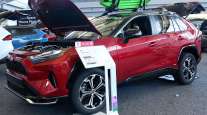Senior Reporter
FHWA Issues Waiver to Speed Up Electric Charging Infrastructure

[Stay on top of transportation news: Get TTNews in your inbox.]
To help accelerate construction of electric vehicle charging infrastructure, the Federal Highway Administration has extended until July 2024 a waiver of Buy America requirements for steel, iron, manufactured products and construction materials used to build electric vehicle chargers.
“This short-term, temporary waiver enables EV charger acquisition and installation to immediately proceed while also ensuring the application of Buy America to EV chargers by the phasing out of the waiver over time,” FHWA said in a Feb. 21 Federal Register announcement. “On the effective date of this waiver, it will apply to all EV chargers manufactured by July 1, 2024, whose final assembly occurs in the United States, and whose installation has begun by Oct. 1, 2024.”
But not everyone is convinced that even with the waiver, an adequate charging infrastructure will be in place in time for mandates to begin the adoption of electric vehicles, particularly longhaul heavy trucks. Myriad trucking groups have expressed concerns that the charging infrastructure will be ready in time to meet heavy truck regulatory requirements in California and several states on the East Coast.
FHWA said it is issuing the waiver both after considering the current and projected state of the market, and to encourage an increase in domestic content within the market over time.
“While FHWA acknowledges that some EV charger manufacturers may not be able to produce compliant chargers within the time frame set out in this waiver, FHWA believes that delaying the phases of this waiver to account for such manufacturers goes against the purpose of Buy America requirements and the administration’s goals of realizing American production of EV chargers,” the agency said.

Host Mike Freeze speaks with Online Transport's Randy Obermeyer about diagnostics. Hear the program above and at RoadSigns.TTNews.com.
The Biden administration has laid out “a bold vision for making transformative transportation investments to support job growth and reshape the U.S. transportation system, strengthen the U.S. economy and competitiveness, and support a sustainable energy and climate future,” the FHWA announcement said.
With funding from the National Electric Vehicle Infrastructure Formula Program, FHWA said the administration has set an ambitious goal of building a national network of 500,000 EV chargers by 2030.
But some commenters noted that there may be a significant difference in time between when a charging product is manufactured and when it is installed due to unforeseen circumstances, such as permitting delays, supply chain constraints, utility interconnection delays, delivery delays, prolonged adverse weather, potential workforce shortages, and routine certification and quality checks that commercial operators perform on industrial products before putting them into service.
“Such circumstances could result in EV chargers being manufactured during one phase of the proposed waiver (and consistent with the requirements in place during that phase) and installed in another, resulting in those chargers no longer being covered by this waiver and risking them not being Buy America-compliant,” commenters warned.
Want more news? Listen to today's daily briefing above or go here for more info
In joint comments on the waiver announcement, Natso and SIGMA: America’s Leading Fuel Marketers, said they are unaware of any data suggesting that Buy America-compliant 350 kW chargers are available at scale today or will be available in time to meet the timelines established under the proposed waiver.
In comments in September on the administration’s proposed funding road map on EV infrastructure charging, American Trucking Associations said the plan raises some concern because it does not allocate specific monetary amounts for medium- and heavy-duty truck charging needs.
“Trucking begs for an answer to the perennial chicken and egg dilemma facing the industry: what will come first — an EV truck charging network or electric freight trucks? The proposed rulemaking is a critical mechanism to help develop an answer to this age-old question.”




